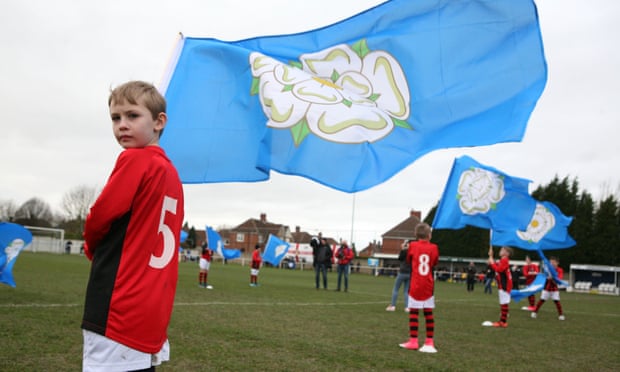Image Credit: [The Observer]
Sports Editor Cian Fox had a chance to speak to the Yorkshire International Football Association, the YIFA, about the county’s new football team.
Freshers at the University of Leeds will soon become acutely aware – if they are not already – that Yorkshire is a unique region of the UK. Away from beer, Wensleydale cheese and the moors is a deep-rooted political identity: the idea that the people of Yorkshire, over 5.3 million of them, consider themselves more Yorkshire than English.
Of course, it is no secret that Yorkshiremen absolutely love the place they call home, and equally love talking about how much they love Yorkshire. But it was from this perspective that an independent football team was formed last year, with the aim of empowering a regional Yorkshire identity – ultimately, creating an international football team that represented Yorkshire.
Devolution isn’t the typical origin for a football team. Nonetheless, in the context of the Scottish independence referendum and Brexit, discontent with the London-centric nature of British politics has been clear for some time now. Regions have been lobbying government to address the concentration of power in Westminster and there has been success, for example, Greater Manchester gained a mayor in May 2017. In Yorkshire, however, devolution pressure groups have existed since 2012, with minimal impact.
Last year, Yorkshire councils were at odds with the government over plans for devolution to Leeds and Sheffield, as they believed the proposals did not go far enough. An alternative plan was launched, with 18 of Yorkshire’s 20 council leaders signing the ‘One Yorkshire’ deal – which sought a directly elected Mayor for Yorkshire and increased responsibility for matters such as transport. For Philip Hegarty, the Yorkshire International Football Association (YIFA) Chairman, this political context was the ideal starting point for an independent Yorkshire football team.
Hegarty’s vision was to connect with ordinary people in Yorkshire who identified with the ‘One Yorkshire’ concept. “Football seemed like an ideal way to do it”, he says, with an independent football team “representing Yorkshire through a sporting lens”.
Devolution isn’t the typical origin for a football team.
It started with a tweet, but, before long Hegarty’s vision was fast becoming a reality. Through avoiding the umbrellas of FIFA, UEFA and the FA, “nothing was stopping you from having your own sporting club or association”, and that is what he did with the YIFA. Officially coming into existence in July 2017, Yorkshire made a Twitter account, gained supporters, created and produced a kit, advertised for players – with the one restriction that naturally they have to be born in the region – and played matches. Most crucially, the YIFA joined Conifa, the Confederation of Independent Football Associations.
Through joining Conifa, Yorkshire are now part of an organisation and league which represents over 300 million people, providing an opportunity for lesser known teams to compete internationally outside of FIFA’s official framework. For Yorkshire, this means playing against the likes of Tibet, Northern Cyprus and Myanmar’s Rohingya.
While the people of Yorkshire have obviously not faced the same struggles as the Rohingya or Tibetan people, Hegarty argues that Conifa’s inclusive outlook means it aims to extend the “opportunity [to join and compete] to people who identify with something other than the state they exist in”, and Yorkshire’s regional identity falls within this definition. The “academic evidence that the majority of Yorkshire people consider themselves more Yorkshire than English” was compelling for Conifa, as it showed that people in Yorkshire identify with a separate regional identity and should therefore be given the platform to represent this identity in international football and sport.
The “academic evidence that the majority of Yorkshire people consider themselves more Yorkshire than English” was compelling for Conifa, as it showed that people in Yorkshire identify with a separate regional identity.
Conifa hosted its own alternative World Cup in May and June, with 16 teams competing across non-league stadiums in London. Yorkshire were unable to compete as they remain a very new force in Conifa, however, Hegarty has high hopes the team will compete in Conifa’s European Football Cup in 2019, set to be held in Artsakh, a de facto state in the Caucasus.

The immediate focus for Hegarty and the YIFA for now is to simply “play more games, and hopefully win more”, with each fixture fostering more and more interest as the team’s exposure grows. The team recently travelled to Jersey to face Parishes of Jersey FC, a new member of Confia, who defeated Yorkshire 2-1. Upcoming fixtures include a home game against Panjab, who represent the Punjabi region of India; this game will be taking place on 11th November at Ossett United’s Ingfield Stadium, with more information available at @YorksIFA on Twitter.
For students in Leeds, the Yorkshire team provides a number of opportunities. Firstly, for students born in Yorkshire, the YIFA represents a great opportunity to play football at a high level, and the club is keen to take advantage of footballing potential at universities like Leeds.
Students who are keen to follow Yorkshire’s journey up close are “very welcome”, says Hegarty, as the YIFA chairman has big plans for Yorkshire Football in the future. The club’s support continues to grow and Leeds students are ideally located to get involved in this remarkable footballing journey, which has grown from devolution and a tweet into a fully fledged international football team.
More information can be found on the team’s website: https://www.yorkshireifa.com/
Cian Fox

